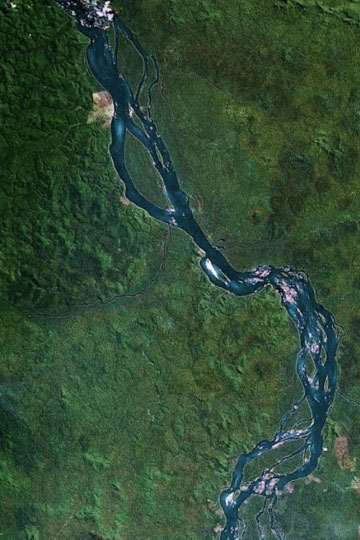The world’s second largest mining company, Vale, has been given the dubious honor of being voted the world’s most awful corporation in terms of human rights abuses and environmental destruction by the Public Eye Awards. Vale received over 25,000 votes online, likely prompted in part by its stake in the hugely controversial Brazilian mega-dam, Belo Monte, which is being constructed on the Xingu River. An expert panel gave a second award to British bank Barclay’s for speculation on food prices, which the experts stated was worsening hunger worldwide. Given not far from the World Economic Forum (WEF) in Davos, Switzerland—a forum that includes corporations, policy-makers, and academics—the Public Eye Awards are a counter-meeting meant to highlight the worst offenses of the global corporate system.
“All the nominations, which we publish annually, reveal a striking absence of the rule of law. The nominations are an outcry against a system in which human rights criminals and environmental desecrators need not fear punishment. This must change,” said François Meienberg with the Berne Declaration (BD). The Public Eye Awards are set up by the Berne Declaration and Greenpeace-Switzerland.
Vale: people’s choice for worst company
 A section of the Xingu River as viewed by Google Earth. |
Vale won around 28 percent of the vote facing seven other competitors. The company was singled out for its role in the Belo Monte dam and alleged human rights abuses at the Carajás mines. According to organizers it was Vale’s purchase of 9 percent stake, the highest of a private company, in the Belo Monte dam that led to its eventual nomination. Diverting 80 percent of the Xingu River’s flow, the dam is also expected to displace 16,000 people, according to the Brazilian government, although environmentalists estimate that 40,000 could be forced to move. Amazon Watch, a group campaigning against Belo Monte, says the dam will flood more than 40,000 hectares of rainforest and irrevocably change the lives of indigenous groups who have relied on the river for centuries.
The Brazilian government says the megadam must be built to meet the rising nation’s power needs. The dam would provide enough energy to power 23 million homes, yet during three to four months of the year critics say it will run on only 10-30 percent capacity due to low waters. But not all the power will go to domestic use: a portion of the power from the dam will to go to Vale and other mining companies.
For its part, Vale has responded to the award by setting up a website to respond to various criticisms.
“In 2011, Vale was rated the best mining company at managing climate change, participating in the Carbon Disclosure Project (CDP)’s ranking for the second consecutive year. In 2012, the company plans to invest US$1.65 billion in social and environmental actions,” the company notes, also pointing to various conservation areas it helped establish.
As to criticism of its stake in Belo Monte, the company responds that the highly controversial project “is consistent with the company’s growth strategy, ensuring the supply of part of its future needs in Brazil.”
Barclay’s: supporting hunger?
UK bank Barclay’s was handed the judge’s award for jumping wholeheartedly into food speculation, which critics say pushes food prices higher worsening hunger and starvation worldwide. A 2011 report found that Barclay’s may be making as much as £340 million in food speculation annually. Global food prices in 2011 on average were the highest yet recorded, and the year also saw the first famine in decades in East Africa where tens of thousands died.
“We hope this award will encourage European lawmakers to introduce tough regulations to curb food speculation and stop banks gambling with food prices while nearly a billion people go hungry. Women, children and elderly people in the Global South are often the hardest hit by food speculation,” said Amy Horton of World Development Movement, the NGO that nominated Barclays for the award.
Barclay’s responded, as reported by the Guardian, with a statement: “A considerable number of studies have demonstrated that financial flows have little or no impact on commodities prices. The factors influencing food prices are complex and multiple, ranging from extreme weather conditions to export bans and rising supply and demand from emerging markets”.
Other nominees included Tepco, Samsung, Syngenta, and Freeport, which were selected out of 45 of those submitted by NGOs worldwide.
Related articles
Brazil begins preliminary damming of Xingu River as protests continue
(01/19/2012) Damming of the Xingu River has begun in Brazil to make way for the eventual construction of the hugely controversial, Belo Monte dam. The Norte Energia (NESA) consortium has begun building coffer dams across the Xingu, which will dry out parts of the river before permanent damming, reports the NGO International Rivers. Indigenous tribes, who have long opposed the dam plans on their ancestral river, conducted a peaceful protest that interrupted construction for a couple hours.
(11/09/2011) Indigenous communities do not have the right to free, prior and informed consultation on the Belo Monte dam because its infrastructure and reservoirs would not be physically located on tribal lands, ruled a Brazilian court.
Global food prices set record in 2011
(01/16/2012) Last year saw the highest average food prices since recording began in 1990, according to the Food and Agriculture Organization’s (FAO) Food Price Index. The Food Price Index’s average for the year was 228 points, 28 points higher than the past record set in 2008.